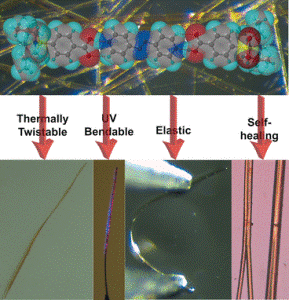Jun 21 2018
Generally, crystals are considered inelastic and brittle. At present, an innovative category of smart, bendable crystalline organic materials has defied this notion. Researchers have developed a molecular, soft cocrystalline structure with the ability to bend and twist in a reversible manner without disintegration upon being stimulated by mechanical force, high temperature, or under UV light. The researchers have described in the Angewandte Chemie journal that this multifunctional nature renders it a sturdy material for advanced molecular electronics and other innovative materials.
 Image credit: Wiley-VCH
Image credit: Wiley-VCH
Crystal structures could be fairly elastic. Only recently has this view emerged, following the synthesis of the first ever dynamic and adaptive molecular crystals a decade back. Crystals with the ability to bend without being disintegrated find attractive applications in flexible electronics, microrobotics, and optical devices. At present, a research team headed by Naba Kamal Nath from the National Institute of Technology, Meghalaya, India, and Panče Naumov at New York University, Abu Dhabi, United Arab Emirates, has extended the range of single crystals a little further.
They created a molecular soft crystal with the potential to twist and untwist when heated and cooled, bend reversibly under UV light, and deform and reform in response to mechanical force. Furthermore, the researchers said that the cracks in the crystals cure themselves over thermal cycling.
The packing of the molecular layers plays a vital role in the crystallinity of molecular organic crystals. Intermolecular interactions (for example, hydrogen bonding), hydrophobic interaction, or interactions between aromatic rings hold these layers in place. The crystals synthesized by Naumov and Nath included two distinctive molecules: probenecid, a drug compound recommended to improve uric acid excretion; and 4,4’-azopyridine, a heteroaromatic azo compound that changes from an elongated to a more bent conformation upon being irradiated by UV light. The single crystals developed from the two molecules contain stacked 2D layers in criss-cross arrangement.
The researchers discovered that heating led to a phase change in this structure, a slight rearrangement resulting in distinctive packing angles. Consequently, there was a twist in the long, thin crystal fibrous sheet, which does not last forever. When the material was cooled, its original molecular order was restored, and the sheet became straight again. Furthermore, mechanical bending was achieved without cracking, and irradiation under UV light led to fast, reversible bending.
Apart from combining three functionalities—elastic bending brought about by mechanical force, reversible twisting when heated, and fast, reversible bending under UV light—the material also cured on its own: The researchers also noted that when the crystal was cycled between ambient temperature and higher temperatures, the small cracks and splits disappeared.
These effects relate to an astonishing multifunctionality of the organic crystal. Hence, it is suggested as a robust material for the future generation of flexible electronics, solid-state semiconductors, and other technologies in which a blend of evidently conflicting mechanical properties is sought after.